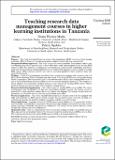| dc.contributor.author | Mosha, Neema | |
| dc.contributor.author | Ngulube, Patrick | |
| dc.date.accessioned | 2022-09-06T05:48:08Z | |
| dc.date.available | 2022-09-06T05:48:08Z | |
| dc.date.issued | 2022-08-24 | |
| dc.identifier.uri | http://dx.doi.org/10.1108/LM-04-2022-0033 | |
| dc.identifier.uri | https://dspace.nm-aist.ac.tz/handle/20.500.12479/1565 | |
| dc.description | This research article was published by Emerald Publishing Limited, 2022 | en_US |
| dc.description.abstract | Purpose – The study investigated teaching research data management (RDM) courses in higher learning
institutions (HLIs) in Tanzania to enable postgraduate students to work with their research data.
Design/methodology/approach – The study triangulated research methods. Postgraduate students were
investigated using survey questionnaires to learn about their needs and perceptions of the teaching RDM
courses in HLIs. Key informants (academicians, information and communication technologists and library
staff) were also investigated using in-depth interviews to explore their experiences and knowledge of teaching
RDM courses. SPSS statistical software was used for analysing quantitative data; qualitative data were
analysed thematically.
Findings – A total of 70 questionnaires were distributed to postgraduate students with a returning rate of 44
(69%). On the other hand, 12 key informants were interviewed. A low level of RDM literacy was revealed among
38 (86%) respondents. Most respondents 40 (91%) reported the need for HLIs to start teaching RDM courses. A
lack of skills and knowledge in teaching RDM courses was revealed among key informants. The competency based, adaptive and constructive teaching techniques were selected for teaching RDM courses, whereas
intensive training and online tutorials were revealed as teaching formats.
Research limitations/implications – This study focused on teaching RDM courses in HLIs. The survey
questionnaires were distributed to all 2nd year postgraduate students, however, the findings cannot be
generalised to all postgraduate students due to the response rate obtained. The findings obtained from key
informants can also not be used as a basis for generalization across HLIs.
Practical implications – This study concluded that postgraduate students need to be well equipped with
skills and knowledge on RDM and its related concepts; teaching RDM courses should be regarded as a
continuous programme for benefit of students, researchers and the community at large.
Social implications – Appropriate teaching of RDM courses among students not only ensures that students
meet the funders’ and publishers’ requirements, but also encourages students to store and share their research
among researchers worldwide; thus increasing collaboration and visibility of the datasets and data owners
through data citations and acknowledgements.
Originality/value – This is a comprehensive study that provides findings for HLIs to teach RDM courses in
HLIs, especially for postgraduate students. The findings revealed the need for teaching RDM courses in HLIs.
The study provides the basis for further RDM research in HLIs and research institutions. | en_US |
| dc.language.iso | en | en_US |
| dc.publisher | Emerald Publishing Limited | en_US |
| dc.subject | Research data management | en_US |
| dc.subject | Postgraduate students | en_US |
| dc.subject | Research data management courses | en_US |
| dc.subject | Teaching | en_US |
| dc.title | Teaching research data management courses in higher learning institutions in Tanzania | en_US |
| dc.type | Article | en_US |

